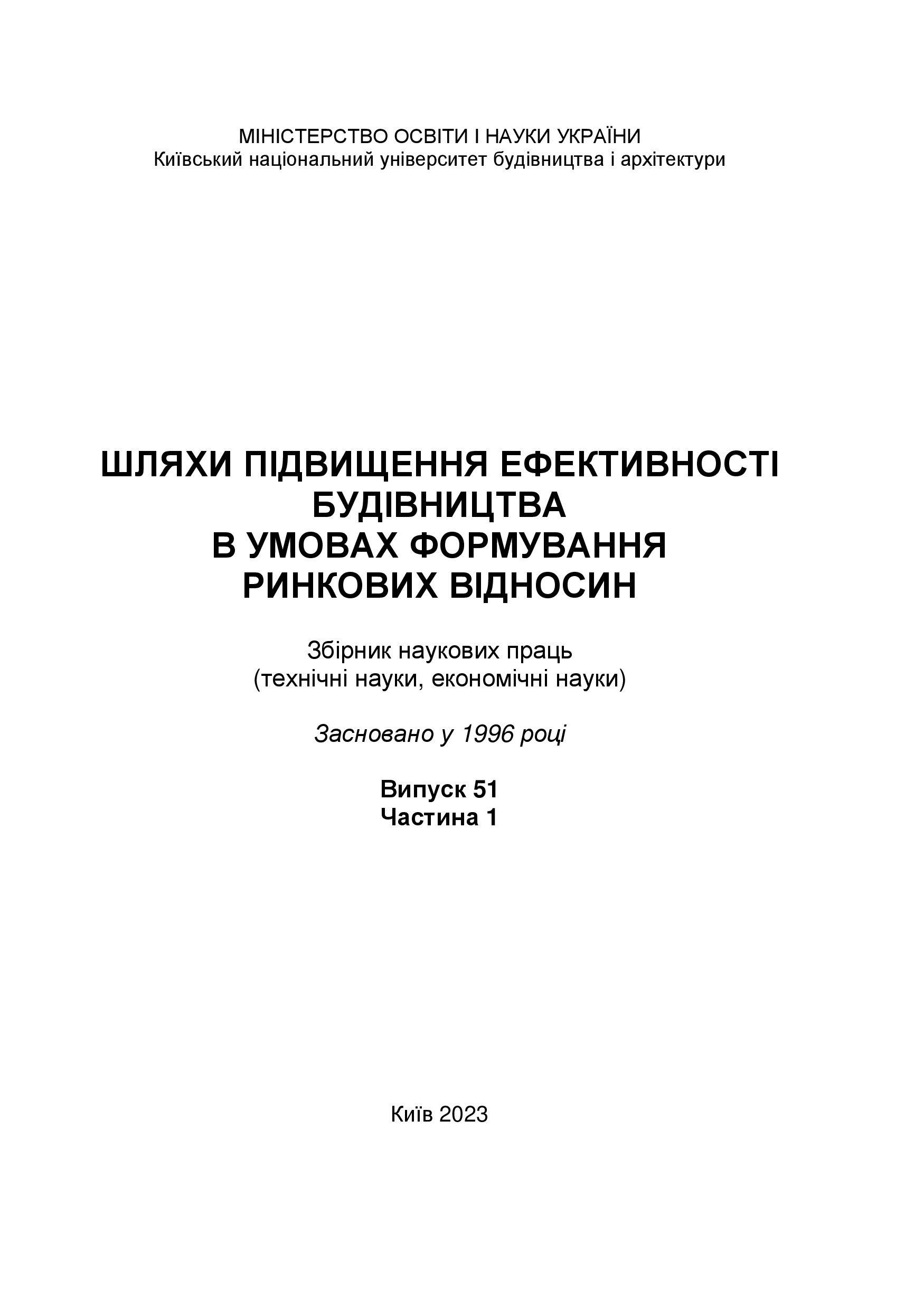Methodological and practical approaches and principles of implementation of vim technologies in the activities of construction participants
DOI:
https://doi.org/10.32347/2707-501x.2023.51(1).290-299Keywords:
innovations, digitalization, building information modeling (BIM), digital transformation, the object's life cycle, engineering, design and estimate documentation, ВIM design, cost of project works, marketing strategy, pricing, cost management, digital innovation, contractor, designer, developer, engineering company, construction project enterprises, stakeholders and construction participantsAbstract
In an era marked by constant technological changes and the transition of many business processes of enterprises to digital reality, construction participants are forced to review their principles and methods of construction work in order to remain at the forefront of innovative activities. This article examines methodological and practical approaches, as well as the main principles used for the successful integration of ideology, technologies and principles of building information modeling (BIM) into the operational structure of construction participants and stakeholders (using the example of engineering enterprises).The methodology lays the foundation for the implementation of BIM, emphasizing the strategic and combination of systemic, situational, function-oriented and process-oriented approaches, provides guidance to companies on adapting the implementation of building information modeling to improve productivity, optimize work processes and optimize overall project results. As a result of the transformative impact of BIM on project stages, from initial planning and design to modeling, construction and ongoing maintenance, digitization acts as a catalyst for positive change in projects.The article examines how building information modeling technologies fit within existing systems and project management actors commonly used in engineering practice and improve them. Issues related to data sharing and collaboration between interdisciplinary team members (designers, contractors, developers, suppliers, engineering firms, etc.) are addressed, demonstrating how building information modeling can be integrated into a variety of engineering processes.By offering a synthesis of methodological approaches, practical ideas, and overarching principles, the paper provides academics and construction professionals with a framework for implementing VIM, contributing to a paradigm shift toward more advanced, sustainable, and effective engineering practices.
References
Економетричний інструментарій управління фінансовою безпекою підприємств будівництва: [моногр.] / Л.В. Сорокіна, А.Ф. Гойко, С.П. Стеценко, К.В. Ізмайлова та інші / За наук. ред. д.е.н., проф. Л.В. Сорокіної, к.е.н., проф. А.Ф. Гойко К.: КНУБА, Кривий Ріг: Видавець ФОП Чернявський Д.О. 2017. 404 с.
Nikolaiev V. P., Hryhorovskyi P. Ye., Khyzhniak V. O., Ryzhakova G. M., Bielienkova O. Yu., Molodid O. S. Technical and economic aspects of real estate properties : collective monograph. Lviv-Toruń : Liha-Pres, 2019. 124 p.
Tuhai O., Pokolenko V., Ryzhakova H., Prykhodko D., Lahutina Z., Stetsenko S. Modernized tools of construction development management. Ways to increase the efficiency of construction in the formation of market relations. 2012. № 27/1, р. 86 – 98.
Сорокіна Л.В. Інформаційні технології як інструмент оптимізації управління збалансованим економічним розвитком підприємства. Актуальні проблеми економіки. 2007. № 10. С. 189 – 197.
Tugai O.A. Organizational and technological, economic quality control aspects in the construction industry: collective monograph. Lviv-Toruń: Liha-Pres, 2019. 136 p.
Зельцер Р.Я. Інноваційні моделі і методи організації, управління і економічної оцінки технологічних процесів будівельного виробництва: монографія. Київ: «МП Леся», 2018. 208 с.
Лівінський О.М. Економіка будівництва: навч. посібник. Київ: «Видавництво Людмила», 2019. 224 с..
Економіка будівельного підприємства: навчальний посібник/С.П.Стеценко та інш. К.:Ліра-К, 2022. 508 С.
Bielienkova O., Novak Y., Matsapura O., ZapiechnaY., Kalashnikov, D., Dubinin, D. Improving the Organization and Financing of Construction Project by Means of Digitalization. International Journal of Emerging Technology and Advanced Engineering, 2022, 12(8), стр. 108–115.
Бєлєнкова О.Ю. Цифрова трансформація будівництва: механізм взаємодії бізнесу, науки, держави. Будівельне виробництво. 2019. № 66. С. 30–36.
Ізмайлова К.В., Ізмайлова О.В. (2010) Система експертизи ефективності інвестиційних на стадії техніко-економічного обґрунтування. Управління розвитком складних систем, 4, 45–54.
Stetsenko S. P. Management of Adaptation of Organizational and Economic Mechanisms of Construction to Increasing Impact of Digital Technologies on the National Economy. Journal of Reviews on Global Economics. 2020. № 9. Р. 149-164.
Honcharenko, T., Chupryna, Y., Ivakhnenko I., Tsyfra, T., Zinchenco, M. Reengineering of the Construction Companies Based on BIM-technology // International Journal of Emerging Trends in Engineering Research, 2020, volume 8.№8, http://www.warse.org/IJETER/static/pdf/file/ijeter22882020.pdf
Gerbert P., Castagnino S., Rothballer C., and Filitz R. Digital in Engineering and Construction. The transformative power of building information modeling. The Boston Consulting group (BCG). 2016. URL: http://surl.li/ntqka
Think act beyond mainstream. Digitization in the construction industry. Building Europe’s road to «Construction 4.0». Civil Economics, Energy & Infrastructure Competence Center. 2016. URL: https://www.rolandberger.com/publications/publication_pdf/tab_digitization_construction_industry_e_final.pdf
Winning with connected construction. Digital opportunities in engineering and construction. Deloitte & Touche LLP. 2019. URL: https://www2.deloitte.com/content/dam/Deloitte/us/Documents/manufacturing/digital-opportunities-in-engineering-and-construction.pdf/
Wiki. 3D printing in construction URL: https://www.designingbuildings.co.uk/wiki/3D_printing_in_construction.
Robo-bulldozers guided by drones are helping ease Japan’s labor shortage URL: http://surl.li/ntqkp.
BIM-технології: поняття, історія розвитку, перспективи. Курс лекцій. URL: http://surl.li/fcxzf.
Downloads
Published
How to Cite
Issue
Section
License

This work is licensed under a Creative Commons Attribution 4.0 International License.
Authors who publish with this journal agree to the following terms:
- Authors retain copyright and grant the journal right of first publication with the work simultaneously licensed under a Creative Commons Attribution License that allows others to share the work with an acknowledgement of the work's authorship and initial publication in this journal.
- Authors are able to enter into separate, additional contractual arrangements for the non-exclusive distribution of the journal's published version of the work (e.g., post it to an institutional repository or publish it in a book), with an acknowledgement of its initial publication in this journal.
- Authors are permitted and encouraged to post their work online (e.g., in institutional repositories or on their website) prior to and during the submission process, as it can lead to productive exchanges, as well as earlier and greater citation of published work (See The Effect of Open Access).

